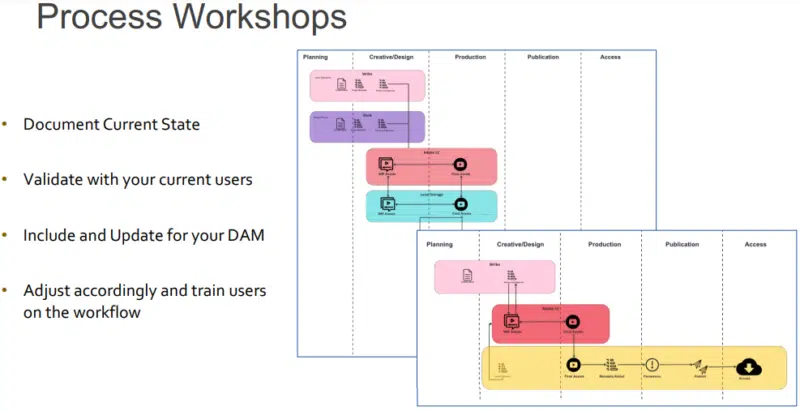3 questions to ask about digital asset management processes
After asking these questions, communicate the new process to your team using process workshops and visualizations.
One of the biggest challenges an organization faces with running a digital asset management (DAM) system is managing the processes and people who work on it.
“It’s challenging because processes are sometimes embedded in our workplace and it’s difficult to change that,” said John Horodyski, managing director for Salt Flats, and a MarTech contributor, in a session at The MarTech Conference. “And furthermore, with people and processes, they do change — quite often, actually — creating gaps in the tacit knowledge of any business over time.”
Here are three questions to think about related to DAM processes.
1. Am I alleviating or adding to the DAM workload?
“Any new DAM process should have a goal of alleviating a pain point or removing unnecessary workflow from a user’s plate,” said Horodyski.
An overview of the entire workflow of your organization’s DAM will help you decide whether a new process will help the team or set it back.
Dig deeper: Building a DAM business case
2. How can I use DAM to automate processes?
Use the data foundation you’ve built for your DAM to automate things like content sharing and publishing. Use the metadata around assets to analyze and archive the assets.
This will all help make processes more efficient, making the DAM even more valuable to the organization.
3. How will I communicate DAM processes to users?
“Each new process you implement needs to have a positive side to it, and you need to hammer home the new efficiency that you will be bringing,” said Horodyski.
This communication to your team members should come through regularly planned meetings. Ensure you are targeting the users performing these processes so you’re not wasting people’s time. Also, provide training on the new processes at these meetings or one-on-one.
Using workshops to establish new processes
To build a new DAM process, gather the relevant people in a collective intelligence workshop.
To help in documenting the new process, you can use a visualization. Color code each technology connected to the process and the DAM, so users can identify which tools the process includes.

“As you start to map this workflow across different pieces of technology, you can also map the people who are responsible for the different tasks that you’re mapping out, as well as the metadata that you are [using] between these different pieces,” said Ryan Murphy, managing director, insights and analytics at Salt Flats.
“Once you create these current state workflows, you want to validate them with your current users, then you want to update your current state workflows for your new DAM system,” he explained. “And this is really powerful because you can start to show your users what systems are going to be sunset by your new DAM system.”
To find out more about managing a DAM that’s flexible and adaptable, read:
Contributing authors are invited to create content for MarTech and are chosen for their expertise and contribution to the martech community. Our contributors work under the oversight of the editorial staff and contributions are checked for quality and relevance to our readers. MarTech is owned by Semrush. Contributor was not asked to make any direct or indirect mentions of Semrush. The opinions they express are their own.
Related stories
New on MarTech